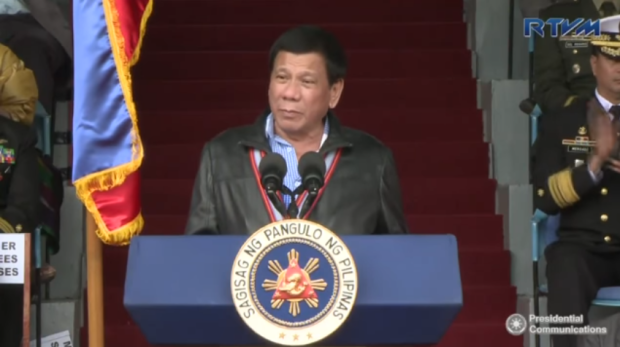
President Rodrigo Duterte delivers his address during the PMA alumni homecoming in Baguio City. SCREENGRAB FROM RTVM
FORT DEL PILAR, BAGUIO CITY—President Duterte on Saturday called for stronger military support for his war on drugs and terrorism and his program to build a peaceful and prosperous nation.
In a speech before Philippine Military Academy (PMA) alumni, Mr. Duterte said that when he was Davao City mayor he “kept on harping” on peace and order because “if there is peace and order, businesses and everything else will follow.”
This could happen to the rest of the country as it did in Davao, he added.
“But I need the help of each one, especially the military, not for social control but [for the] protection of the citizens from the lawless, the reckless and the selfish,” he said.
He made the call a week before the country marked the 31st anniversary of the 1986 Edsa People Power Revolution that ousted dictator Ferdinand Marcos, who used the military to enforce iron rule.
“What I desire for the Philippines is a prosperous country that includes everyone —a peace loving citizenry and people with different beliefs who chose to get along with one another,” he said.
He said government must serve the people “not just the interest of the few.”
“In the past, our government verged on failure because those who were in the position to help deliberately made wrong decisions, which favored only themselves,” he said. “We will always uphold the sanctity of the common good as the highest good.”
Two main threats
He said military support was needed in battling two main threats—the “complex” problem of illegal drugs and terrorism from the Abu Sayyaf, which is engaged in ransom-kidnappings and in bringing the extremism of the Islamic State group into the Philippines from the Middle East.
The President’s appeal to the military comes not long after he sidelined the police from the war on drugs and blasted the corruption in the Philippine National Police.
The President said he had directed government forces to continue “to intensify operations using all available assets and resources” against militants. He added that it was “the only way to secure Mindanao.”
‘Land of Promise’
But he said Mindanao, the “Land of Promise” where his family had migrated from the Visayas, “is threatened by climate change caused by man-made diseases like extractive industries,” referring to some mining operations that wreck the environment.
“The rest of the nation,” he added, “is threatened by the widening gap between the rich and the poor, crime, corruption, criminality and illegal drugs.”
The President is an adopted member of PMA Class of 1967. He was formally adopted as an honorary alumnus of the country’s premier military academy, which he held up as a model for the nation.
“While I never pretended to be a saint, I note that righteousness and discipline are the foundations of a nation. That is why I appreciate the PMA. You have the template of discipline and civility,” he said.
In response to the President’s call, the PMA Alumni Association Inc. issued a manifesto supporting his “initiatives, advocacies and decisions in the war against corruption—and criminality in general, most particularly against illegal drugs, heinous crimes and terrorism, [and] for his pursuit for lasting peace.”
“We call on the Filipino citizens to support the President and other leaders in the governing of the country toward attaining lasting peace and economic prosperity,” said the statement, which was read by association chair Anselmo Avenido Jr.
The President has been cultivating close ties with the military, visiting many military camps around the country in his first months in office, promising troops medical and combat equipment and increased benefits.
He had also explained to the troops his decision to initiate peace talks with communist insurgents, which he did not touch on in his speech.
He had also condoled with families of slain soldiers, and visited the wounded in hospitals. —WITH A REPORT FROM LEILA B. SALAVERRIA